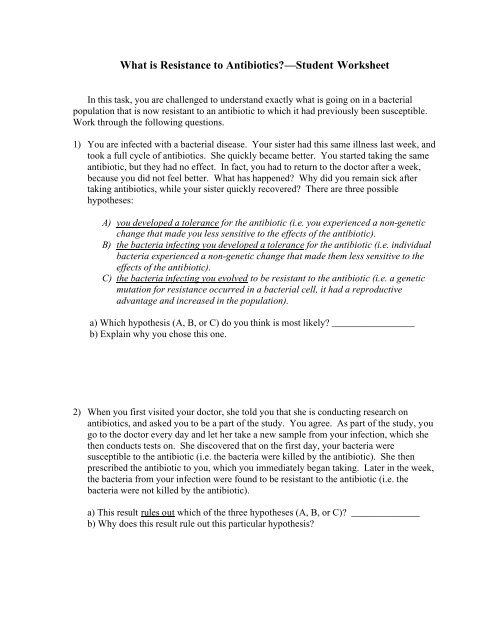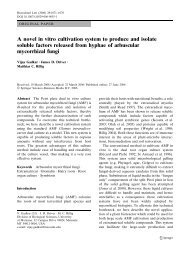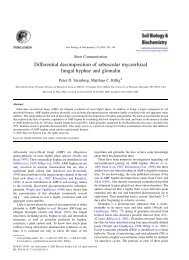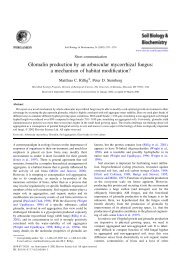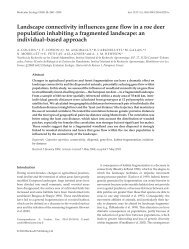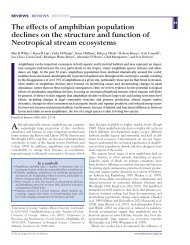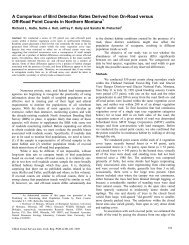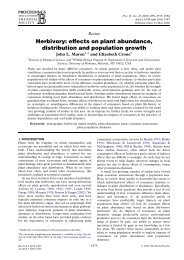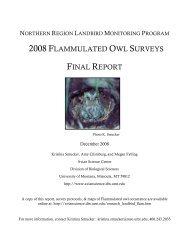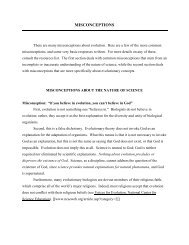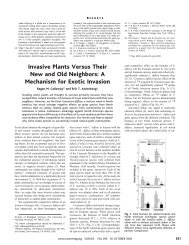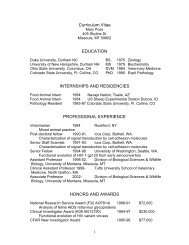Evolution of Antibiotic Resistance-Printable Format - Teach ...
Evolution of Antibiotic Resistance-Printable Format - Teach ...
Evolution of Antibiotic Resistance-Printable Format - Teach ...
Create successful ePaper yourself
Turn your PDF publications into a flip-book with our unique Google optimized e-Paper software.
What is <strong>Resistance</strong> to <strong>Antibiotic</strong>s?—Student Worksheet<br />
In this task, you are challenged to understand exactly what is going on in a bacterial<br />
population that is now resistant to an antibiotic to which it had previously been susceptible.<br />
Work through the following questions.<br />
1) You are infected with a bacterial disease. Your sister had this same illness last week, and<br />
took a full cycle <strong>of</strong> antibiotics. She quickly became better. You started taking the same<br />
antibiotic, but they had no effect. In fact, you had to return to the doctor after a week,<br />
because you did not feel better. What has happened? Why did you remain sick after<br />
taking antibiotics, while your sister quickly recovered? There are three possible<br />
hypotheses:<br />
A) you developed a tolerance for the antibiotic (i.e. you experienced a non-genetic<br />
change that made you less sensitive to the effects <strong>of</strong> the antibiotic).<br />
B) the bacteria infecting you developed a tolerance for the antibiotic (i.e. individual<br />
bacteria experienced a non-genetic change that made them less sensitive to the<br />
effects <strong>of</strong> the antibiotic).<br />
C) the bacteria infecting you evolved to be resistant to the antibiotic (i.e. a genetic<br />
mutation for resistance occurred in a bacterial cell, it had a reproductive<br />
advantage and increased in the population).<br />
a) Which hypothesis (A, B, or C) do you think is most likely? _________________<br />
b) Explain why you chose this one.<br />
2) When you first visited your doctor, she told you that she is conducting research on<br />
antibiotics, and asked you to be a part <strong>of</strong> the study. You agree. As part <strong>of</strong> the study, you<br />
go to the doctor every day and let her take a new sample from your infection, which she<br />
then conducts tests on. She discovered that on the first day, your bacteria were<br />
susceptible to the antibiotic (i.e. the bacteria were killed by the antibiotic). She then<br />
prescribed the antibiotic to you, which you immediately began taking. Later in the week,<br />
the bacteria from your infection were found to be resistant to the antibiotic (i.e. the<br />
bacteria were not killed by the antibiotic).<br />
a) This result rules out which <strong>of</strong> the three hypotheses (A, B, or C)? ______________<br />
b) Why does this result rule out this particular hypothesis?


